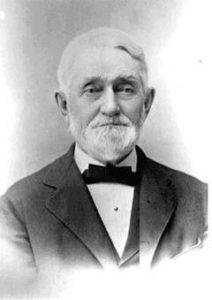Wealthiest Man in Iowa Was Hunterdon Native

When Henry Stout passed away on July 17, 1900, he was recognized for his rags-to-riches life story, leaving Hunterdon County to strike his fortune out west.
Stout was born in Ringoes on October 23, 1814, and grew up here until at the age of 16, and with little money in his pockets, moved to Philadelphia to work in the builder’s trade. He stayed for four years before departing to Iowa, settling in Dubuque with less than $100.
He struggled with poor health for almost a decade while working in the mining business and later a small store. By 1852 he had become such a fine salesman for the Knapp-Tainter Lumber Company that he was offered the opportunity to purchase a one-quarter interest in the company in 1853, according to Renae Kerker’s unpublished thesis The Sage of the Sawdust.
The name of the business was soon changed to Knapp, Stout & Co. and the influence of its new investor was remarkable. Stout was a firm believer in expanding the company. Between 1866 and 1869, the company started three new mills in Wisconsin. It purchased its first steamboat in 1869, and by 1881, had a small fleet of them to move timber downstream to mills. By shipping its own lumber, the company combated stiff competition from nearly two dozen other lumber companies to earn a substantial profit.
When the company incorporated in 1878, it capitalized at $2 million. Four years later, it was valued at $4 million and at $11 million in 1896, when the firm celebrated its 50th anniversary.
Stout’s success in the lumber business encouraged him to diversify his interests to railroads, bridges and banks. He even began breeding horses for harness racing. In 1894, Stout decided to build a trotting and breeding stable. The purchase of a horse known as Nutwood proved to be extremely profitable: Horsemen nationwide brought their brood mares to Stout’s farm, and it is said Nutwood earned his owners $650,000. Stout also became interested in politics and would become Dubuque’s mayor.
Stout was not ostentatious in appearance and generous with his money. He gave a substantial sum toward the building of a hospital and other local nonprofits in Iowa. When he died, he was said to be the wealthiest man in Iowa.
